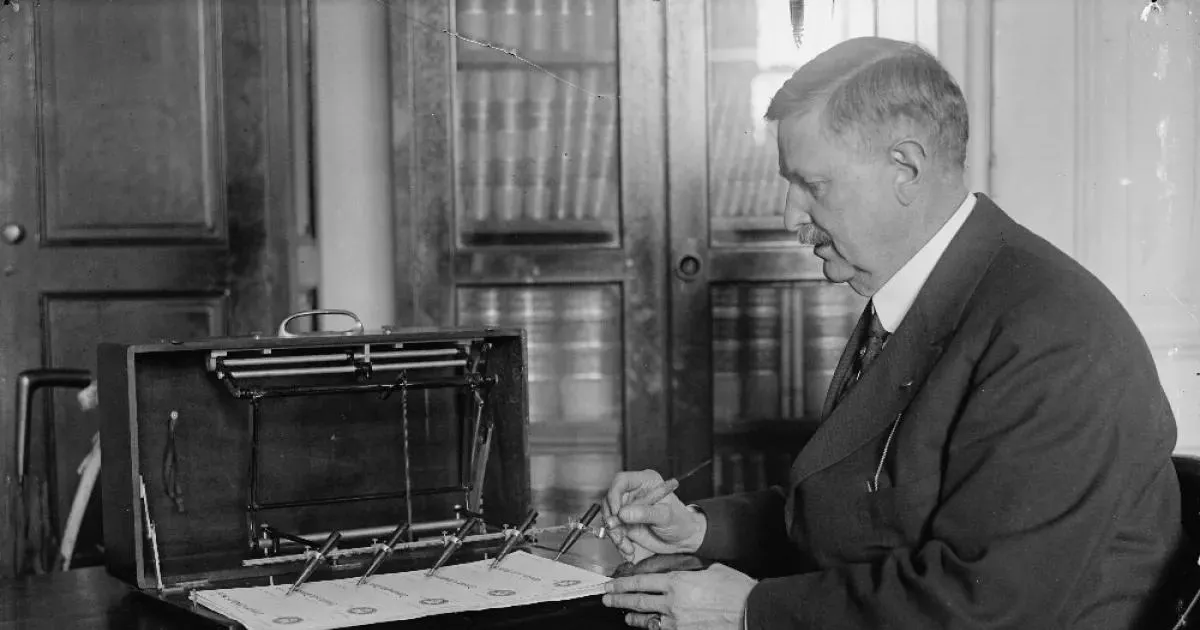An autopen is a mechanical device designed to replicate a person's signature automatically. It is used to sign documents, letters, or other materials in a way that appears to be handwritten, without the need for the individual to physically sign each item. Autopens are often employed by individuals with high volumes of documents requiring signatures, such as politicians or celebrities.
1937: Robot Pen Commercially Available
In 1937, the Robot Pen became commercially available. It recorded a signer's signature and functioned as a storage unit device, similar to vinyl records.
1942: De Shazo Receives Order from the Navy for Autopen
In 1942, Robert M. De Shazo Jr. received an order for his autopen machine from the United States Secretary of the Navy. This marked the beginning of a significant market for autopens within the government, leading to widespread use in Congress, the Senate, and the Executive branches.
2004: Criticism of Donald Rumsfeld's Autopen Use
In 2004, Donald Rumsfeld, the U.S. Secretary of Defense, faced criticism after it was discovered that his office was using an autopen to sign letters of condolence to families of American soldiers killed in war.
2005: George W. Bush Receives Favorable DOJ Opinion on Autopen
In 2005, George W. Bush requested and received a favorable opinion from the Department of Justice regarding the constitutionality of using the autopen, though he did not ultimately use it.
2005: DOJ Responds to Inquiry on Autopen Use by the President
In 2005, the United States Department of Justice responded to an inquiry and found that the use of an autopen by the President of the United States is consistent with the language found in Article I, Section 7 of the Constitution.
January 3, 2013: Obama Signs Bush Tax Cut Extension with Autopen
On January 3, 2013, while vacationing in Hawaii, Barack Obama used an autopen to sign the extension to the Bush tax cuts into law.
2019: Bob Dylan Sells Autopen Signed Artworks
In 2019, some prints of Bob Dylan's artwork sold after 2019 had been signed with an autopen, which he further apologized for and attributed his use of the machine to vertigo and the COVID-19 pandemic.
November 2022: Bob Dylan's Book Signed with Autopen
In November 2022, it was reported that some copies of "The Philosophy of Modern Song", a book by Bob Dylan, had been signed with an autopen. This led to criticism, apologies from Dylan and the publisher, and refunds offered to customers.
May 2024: Biden Uses Autopen for FAA Funding Extension
In May 2024, Joe Biden directed the use of an autopen to sign legislation providing a one-week funding extension for the Federal Aviation Administration (FAA).
2024: Court of Appeals Rules Pardons Don't Need to Be In Writing
Earlier in 2024, the Fourth Circuit Court of Appeals ruled in Rosemond v. Hudgins that pardons do not have to be made in writing.
March 2025: Trump Questions Validity of Biden's Pardons Due to Autopen
In March 2025, President Trump claimed that pardons issued during Biden's presidency were void because they were allegedly signed by autopen.
October 2025: House Committee Finds Biden's Autopen Pardons Invalid
In October 2025, the Republican-led House Oversight Committee concluded that Biden's autopen pardons were invalid due to the use of an autopen, and called for a new investigation by the Department of Justice into the Biden administration.
Mentioned in this timeline

Barack Obama the th U S President - was the...

George W Bush the rd U S President - is...

Bob Dylan is a highly influential American singer-songwriter renowned as...

Joe Biden a member of the Democratic Party served as...

San Francisco is a major commercial financial and cultural hub...

Books are a means of storing information as text or...
Trending

Crystal Dunn also known as Crystal Alyssia Soubrier is a prominent figure in American professional soccer She showcases her versatility...

3 months ago Brandi Carlile releases distinct album 'Returning To Myself', explores themes of solitude.

4 months ago Silver Soars Above $50 Amidst Economic and Geopolitical Turmoil: A Four-Decade Peak

8 months ago Stock Market Climbs Amidst Moody's Downgrade and Debt Concerns: Key Takeaways

2 months ago Bitwise Launches XRP ETF Amidst Market Activity; XRP Staking Explored.

10 months ago Milo Manheim and Liz Gillies bond in Little Shop of Horrors, extend run.
Popular

Thomas Douglas Homan is an American law enforcement officer who...

William Franklin Graham III commonly known as Franklin Graham is...

XXXTentacion born Jahseh Dwayne Ricardo Onfroy was a controversial yet...

Jupiter is the fifth and largest planet from the Sun...

Kristi Noem is an American politician who has served as...

Instagram is a photo and video-sharing social networking service owned...

